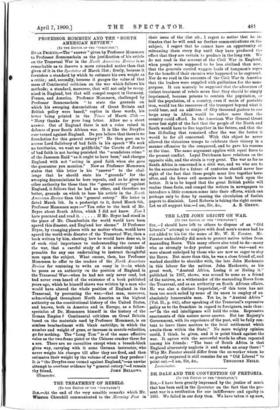their issue of the 31st ult., I regret to notice
that he in. timates that he will send no further communications on the subject. I regret that he cannot have an opportunity of reiterating them every day until they have produced the effect that they are certain to produce in the long run. We do not read in the account of the Civil War in England, when people were supposed to be less civilised than now, that the generals carried waggon loads of hangman's ropes for the benefit of their enemies who happened to be captured. Nor do we read in the accounts of the Civil War in America that the leaders were supplied with guillotines for the same purpose. It can scarcely be supposed that the advocates of violent treatment of rebels mean that they should be simply imprisoned, because prisons to contain the population, or half the population, of a country, even if made of portable iron, would tax the resources of the transport beyond what it could bear, and an addition of fifty thousand gaolers to our large army in Africa would be rather more than the country could afford. In the American War General Grant never lost sight of the fact that the people of the North and South would have to live together in the future, and that the less ill-feeling that remained after the war the better it would be for all concerned. With this object he never allowed the victorious troops to celebrate their victory in a manner offensive to the conquered, and he gave his reasons at the time. The same argument applies with equal force to the present conflict. Loyal Dutchmen have relations on the opposite side, and the strain is very great. The war as far as South Africa is concerned is a civil war, and we who are to be the suzerains for a future of centuries should never lose sight of the fact that these people mast live together here- after, and the fewer evil memories to look back upon the better. It is to be hoped that the great British public will realise these facts, and compel the writers in newspapers to introduce a little common-sense into their efforts, which can perhaps only be done by causing the circulation of foolish papers to diminish. Lord Roberts is taking the right course.
Let us all support him.—I am, Sir, &c., A. S. GREEN.






































 Previous page
Previous page